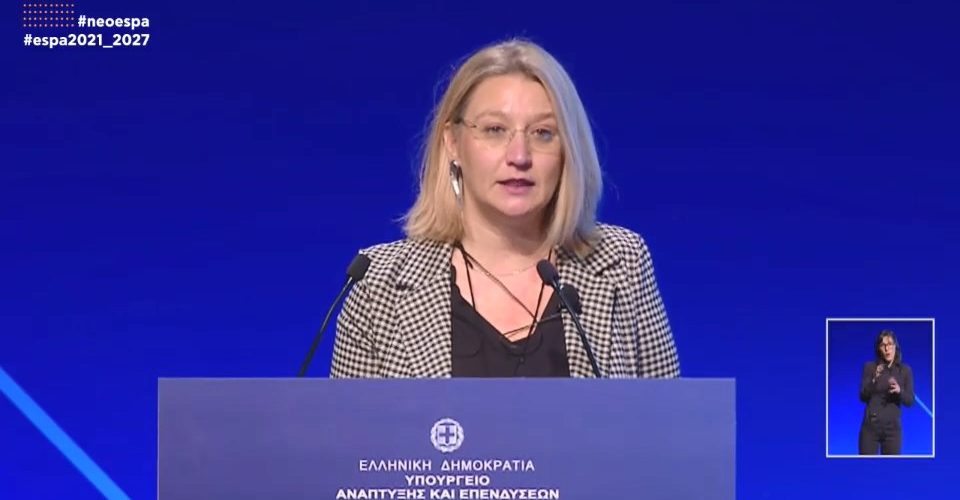Talk by Ioli Christopoulou titled “The critical decade – Financing for a sustainable future” during the National Conference on Growth for the Partnership Agreement 2021- 2027 on Friday, January 17 2020.
You can watch the talk here:
The talk took place during a session on the following topic: “Green and Resilient Europe with Low Carbon Emissions”. Invited speakers were asked to comment on the challenges of green growth, energy, the circular economy, environmental protection and the challenge of the climate crisis in the new decade. The topic of the session corresponds to one of the five policy objectives of the Cohesion Policy during the new programming period.
Ioli Christopoulou focused particularly on how critical this decade is and presented proposals on how the new EU financing must lead to a more sustainable future.
Particularly, she highlighted one “enabling condition” in order for the increase of the mean global temperature to be contained to 1,5ο C and for nature to recover: measures needed must be taken urgently, that is within this decade and not be postponed further into the future.
In order for the objectives regarding emissions reduction, conservation and restoration of land, freshwater and marine ecosystems to be attained, transformative action across all sectors of the economy are needed. It is towards this direction that the funds must be allocated.
It is a positive coincidence that the new programming period is launched at the dawn of this critical decade, so that this first post-crisis development package that Greece receives can become the main mechanism supporting the transition to a sustainable development model, in line with the EU Green Deal.
At the planning of the programming period, Greece is no longer a laggard as important steps in the direction set by the EU Green Deal have been made already. Specifically:
- Greece has committed to and supporters the EU climate neutrality objective by 2050. Moreover, it has committed, also through its NECP, to a complete lignite phase out by 2023, with the exception of the Ptolemaida 5 lignite plant which is set to close in 2028.
- Greece has also initiated a Just Transition process for its lignite regions. It has already established a national financial mechanism to support these regions through public funds allocated via its own Green Fund. Moreover the lignite regions collaborate with the EU Coal Regions in Transition Platform. The two regions have already initiated processes to plan their post-lignite future.
- On nature, Greece has already designated 27.4% of its land and 19.6% of its marine area as Natura 2000. This is among the highest percentages compared to other EU countries and close to the target set by the UN “zero draft” on the post-2020 biodiversity framework. In addition, Greece has already submitted to the EC its Prioritized Action Framework, which includes its funding needs.
While these steps taken are important, additional are needed.
At the EU level, given that the negotiations are still ongoing, Greece must support more ambitious climate and biodiversity targets as well as a complete exception of fossil fuels (including fossil gas) from EU funding. Specifically, with respect to the ERDF and the Cohesion Fund, the climate commitment must be raised to 40% compared to 30% and 37% respectively proposed to date. In addition Greece must support the European Parliament’s proposal for 10% commitment of the EU budget to biodiversity.
Greece must also seek greater support for the commitments already taken. Consequently, Greece must seek a clear connection between commitment to and timeline of implementation of a lignite phase-out and access to funds from the EU Just Transition Mechanism.
Regarding nature, Greece must ensure that the level of funding for biodiversity is proportional to the area that member states have designated as Natura 2000.
At the national level, it is important that all funded actions support the framework provided by the EU Green Deal. The objectives, priorities and the new projects must be filtered through strict climate and environmental criteria, while at the same time being adjusted to the specific characteristics of each region. Priority must be given to those sectors that are more important for the national economy and have the greatest environmental impact. In addition to energy, the new programming period must support the transition of the tourism, transport, agriculture (obviously also through the Rural Development Fund) to a new development model.
For the attainment of these objectives, it also crucial to seek the proper implementation of the partnership principle, both at the level of planning as well as during the governance and the monitoring of the implementation of the new programming period.
Finally, the implementation must be forward-based. The transformative action must begin already in 2021.
Based on these proposals, funds from the new programming period can contribute in building a truly sustainable future.



